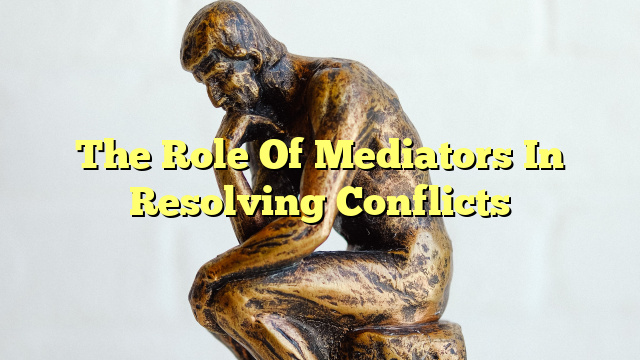Conflict is an unavoidable part of life. Whether between two people, two countries, or two companies, conflict will arise. As the world grows more complex, the need for speedy resolution to disputes increases. Mediation is one of the most popular methods of resolving disputes.
The role of a mediator is to facilitate communication between parties in conflict and help them reach an agreement. Mediators are impartial and neutral. They do not take sides or make decisions for the parties involved. Rather, they provide a safe space for parties to discuss their issues and come to a mutually agreeable resolution.
Table of Contents
- What is Mediation?
- Why Should I Use Mediation?
- Mediation Benefits
- The Role of the Mediator
- Mediation Skills
- Books on Mediation and Conflict Resolution
What is Mediation?
Mediation is a voluntary, non-adversarial process used to resolve disputes. The process is often informal and confidential, and includes the presence of a neutral third-party (the mediator) who helps facilitate communication between the parties and helps them reach a mutually acceptable resolution. The mediator’s role is to facilitate communication, ensure a safe environment, and ensure that both parties have an opportunity to be heard.
Mediation is an alternative to traditional litigation. It is often faster, less expensive, and less adversarial than litigation. Unlike litigation, mediation is not limited to legal issues; it can be used to resolve any type of dispute. It is often used to resolve business disputes, family disputes, and employment disputes.
Why Should I Use Mediation?
Using mediation to resolve disputes offers numerous benefits. Mediation is often faster and less expensive than litigation. It can also provide an opportunity for the parties to explore creative solutions to their conflicts. Further, mediation is confidential and offers an opportunity for the parties to communicate directly with each other in a safe and respectful environment.
Mediation can also provide an opportunity for the parties to repair or even strengthen their relationship, since they are working together to reach a resolution. This is particularly important in cases of family disputes, employment disputes, and other issues that involve ongoing relationships.
Mediation Benefits
Using mediation to resolve disputes offers numerous benefits. These benefits include:
- Confidentiality – Mediation is private and confidential.
- Faster Resolution – Mediation is often much faster than litigation.
- Less Expensive – Mediation is usually less expensive than litigation.
- Creative Solutions – Mediation offers the opportunity to explore creative solutions to disputes.
- Mutually Satisfying Resolution – Mediation allows parties to reach a resolution that is mutually satisfactory.
- Repair or Strengthen Relationships – Mediation can provide an opportunity to repair or even strengthen relationships.
The Role of the Mediator
The mediator’s role is to facilitate communication between the parties and help them reach a mutually acceptable resolution. The mediator is impartial and neutral. They do not take sides or make decisions for the parties involved. They should strive to create a safe environment where both parties can express themselves without fear of being judged. The mediator should also ensure both parties have an opportunity to be heard.
The mediator should also ensure all parties understand the process and the agreement reached. They should explain the process and answer any questions the parties have. They should also provide the parties with a written agreement that outlines the terms of the agreement


Mediation can be a beneficial tool for resolving conflicts.